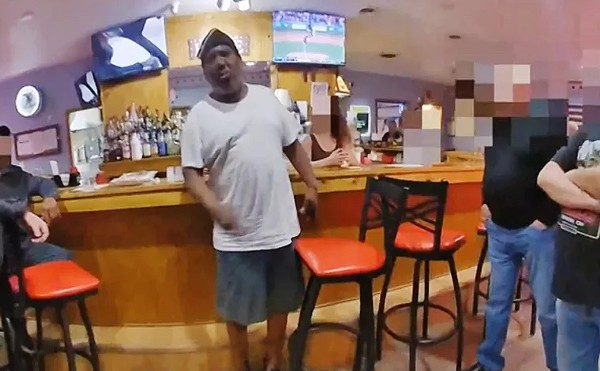Cleveland's Most Fascinating Medical Stories: The New House and Sudden Psychosis
By Dr. Corey Meador on Thu, Jun 9, 2022 at 2:13 pm
[
{
"name": "Ad - NativeInline - Injected",
"component": "38482495",
"insertPoint": "3",
"requiredCountToDisplay": "5"
},{
"name": "Real 1 Player (r2) - Inline",
"component": "38482494",
"insertPoint": "2/3",
"requiredCountToDisplay": "9"
}
]
Jamie had a new house in a Cleveland suburb, a stable job, a devoted husband, and yet something in her mind was amiss. Her mother and husband had expressed their concerns to the psychiatrist — she was acting paranoid and seemed uncomfortable sharing her thoughts with anyone. Dr. James Rodio, sitting across the desk from Jamie, noticed the stark difference in his patient: she was psychotic. He suspected, of all things, that Jamie’s decision to sell her house at peak market price was at the core of her psychosis.
Unlike most doctors, psychiatrists don’t have the luxury of blood tests, scans, or microscopic clues to help establish a diagnosis. Dr. Rodio must rely on observation. After treating Jamie over many years for opioid addiction and depression, both in remission, he discerned a new quiet yet restless affect in her, a lot going on beneath the surface. This was his first clue, which psychiatrists describe as ‘guarded’. Next, she had fixed delusions. For example, she was certain people at work were talking about her behind her back: on the phones, in emails, and in the subtle whispers of the office. Worst of all, she thought her husband was spying on her with the video surveillance system he was installing at their new house. Sure, they had a security system at their old house. But now she could tell he was looking at her differently.
Beyond treating patients, Dr. Rodio is also a forensic psychiatrist, testifying before courts on defendants' mental statuses. He knows well that people who are psychotic can act on irrational thoughts or they can retreat deeper into their own world. Reaching people with psychosis for treatment can sometimes be very difficult. Thankfully, Jamie kept her appointments. Never before did she display signs of psychosis and it would have been unusual at her age to develop schizophrenia.
People can have isolated psychotic episodes for reasons other than schizophrenia, such as drugs, depression, and trauma. With the information gained from the husband, Dr. Rodio knew she wasn’t using drugs. She did however complain of feeling more stressed and anxious at work. It was prudent to ask, what has changed recently? People don’t like change.
What was painfully obvious to Dr. Rodio was that Jamie was exhausted. Now, three months after their move, Jamie thought the new suburb was less safe. She was seeing shadows at night, hearing weird noises outside, and was sure the furniture was being moved around the house. Hallucinations? With further prodding, Jamie admitted she hadn’t been sleeping well since the move — maybe three hours a night.
A major component of Dr. Rodio’s satisfaction from his work is helping people achieve stability. The opportunity to live a happy life is too often stolen by addiction and mental illness. And so, Dr. Rodio has relationships with patients that can last years, patient and doctor steadfast in this pursuit of health. With time, Dr. Rodio better understood what was afflicting Jamie.
Jamie was psychotic due to the fact that she hadn’t been sleeping well in her new house. Such a change at first glance, familiar bed in a new house that made creepy noises in a neighborhood Jamie didn’t love, seemed trivial. Yet, this wreaked havoc on her sleep, and, in an insidious fashion, led to psychosis and a fear of the world around her. Given the worry of erratic behavior that can accompany this mental state, Dr. Rodio nearly pursued admitting her into a psychiatric ward. They hoped that treatment would act quickly. In the meantime, he urged her husband to lock and hide their gun.
Antipsychotics work on specific dopamine neural pathways in the brain responsible for psychosis, regardless of what’s causing the aberration. Jamie was started on an antipsychotic. To treat the underlying problem, she was given a medicine used for sleep and depression. This would help her adjust to her new situation.
Call it a miscalculation, weighing the financial benefits of the sale with the unforeseen destabilizing effects of a move. But now, Jamie was no longer psychotic. She had doubted her marriage, struggled to perform at work, and became suspicious of the people closest to her. Dr. Rodio validated that her lack of sleep for months on end, and nothing more, was enough to spark this nightmare.
Jamie is sleeping better. She’s reflecting on the value of stability and happiness, amazed at this chunk of time in her life where everything seemed a blur. She’s taking time off work, considering what is next. And they're asking a new question: Should they sell their new house?
Dr. Corey Meador is a practicing family medicine physician in Cleveland who has written for PBS NewsHour and The Washington Post. He obtained degrees from Loyola Marymount University School of Film & Television in Los Angeles and Drexel University College of Medicine.
SCENE Supporters make it possible to tell the Cleveland stories you won’t find elsewhere.
Become a supporter today.
Scroll to read more Cleveland News articles
Newsletters
Join Cleveland Scene Newsletters
Subscribe now to get the latest news delivered right to your inbox.














